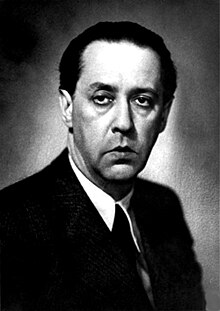Sándor Márai
Sándor Márai | |
|---|---|
 Márai in the early 1940s | |
| Born | Sándor Károly Henrik Grosschmid de Mára April 11, 1900 Kassa, Kingdom of Hungary (now Košice, Slovakia) |
| Died | February 21, 1989 (aged 88) San Diego, United States |
| Occupation |
|
| Language | Hungarian |
| Education | Eötvös Loránd University, Leipzig University |
| Period | 1918–1989 |
| Notable works | Embers (1942) |
| Notable awards | Kossuth Prize (in memoriam) |
| Spouse | Ilona Matzner |
| Relatives | Géza Grosschmid (father) [1] |
| Signature | |


Sándor Márai (Hungarian:
Biography
Márai was born on 11 April 1900 in the city of
He wrote very enthusiastically about the First and Second Vienna Awards, in which as the result of the German-Italian arbitration Czechoslovakia and Romania had to give back part of the territories that Hungary lost in the Treaty of Trianon, including his native Kassa (Košice). Nevertheless, Márai was highly critical of the Nazis.
Márai authored 46 books. His 1942 book Embers (Hungarian title: A gyertyák csonkig égnek, meaning "The Candles Burn Down to the Stump") expresses a nostalgia for the bygone multi-ethnic, multicultural society of the Austro-Hungarian Empire, reminiscent of the works of Joseph Roth. In 2006 an adaptation of this novel for the stage, written by Christopher Hampton, was performed in London.[5]
He also disliked the
He continued to write in his native language, but was not published in English until the mid-1990s. Like other memoirs by Hungarian writers and statesmen, his Föld! Föld! was first published in the West in 1971, because it could not be published in the Hungary of the post-1956 Kádár era. The English version of this memoir was published posthumously in 2001. After his wife died in 1986, Márai retreated more and more into isolation. In 1987, he lived with advanced cancer and his depression worsened when he lost his adopted son, John. He ended his life[8] with a gunshot to his head in San Diego in 1989. He left behind three granddaughters; Lisa, Sarah and Jennifer Márai.
Largely forgotten outside of Hungary, his work (consisting of poems, novels, and
Evaluation
“Hungarian Sándor Márai was the insightful chronicler of a collapsing world." – Le Monde
"It is perhaps one of the [works that] thus impacted me a lot." - Dilma Rousseff on the book Embers.
Bibliography
Translated into English
- The Rebels (1930, published in English in 2007, translation by ISBN 0-375-40757-X
- Esther's Inheritance (1939, published in English in 2008), Hungarian title: Eszter hagyatéka. ISBN 1-4000-4500-2
- ISBN 0-375-71296-8
- Portraits of a Marriage (1941 & 1980, published in English in 2011), Hungarian titles: Az igazi (1941) and Judit... és az utóhang (1980) ISBN 978-1-4000-9667-1
- ISBN 0-375-70742-5
- Memoir of Hungary (1971, published in English in 2001), Hungarian title: Föld, föld...! ISBN 963-9241-10-5
- The Withering World: Selected Poems by Sandor Marai (Translations by John M. Ridland and Peter V. Czipott of 163 poems, published in English in 2013) ISBN 978-1-84749-331-6
Gallery
-
Statue of Márai
in Košice -
Márai's place of residence (today's Mäsiarska Street in Košice)
-
Márai's signature
(detail of his statue in Košice) -
Márai's memorial on his former home in Krisztinaváros
Notes
- ^ | influences = Thomas Mann, Gyula Krúdy, Joseph Roth | influenced =
- ^ "Grosschmid János földmérő,a tengermelléki kerület sóbányáinak és kamarai javainak főfelügyelője n:Országh Borbála gy:János,Antal,Gábor,Cecília,Mária-Lujza t:Ferenc a királyi családi birtokok jószágigazgatóságának titkára | Libri Regii | Hungaricana". archives.hungaricana.hu. Retrieved August 28, 2022.
- ^ Leslie Konnyu: Modern Magyar literature: a literary survey and anthology of the xxth century Hungarian authors -PAGE: 95, Publisher: American Hungarian Review, 1964
- ^ Márai, Sándor. "Egy polgár vallomásai." Akadémiai Kiadó, Budapest, 1935.
- ^ Billington, Michael (March 2, 2006). "Embers". Guardian Unlimited. Archived from the original on July 18, 2008. Retrieved November 17, 2017.
- ^ "Search | Petőfi Literary Museum". pim.hu.
- ^ "The Life of Sándor Márai". May 12, 2014. Retrieved November 17, 2017.
- ^ "Sándor Márai". Random House. Retrieved November 17, 2017.
External links
- Official Marai site at Knopf, which is releasing Marai's novels in English:
- Sándor Márai Blog – a fan blog with news, reviews, links
- Márai at Hunlit
- 70 Years Later, A New Chance To Read 'Marriage' NPR story about new translation of "Portraits of A Marriage" (with link to excerpt)
- Sándor Márai and Naples A documentary about Márai's Italian years






